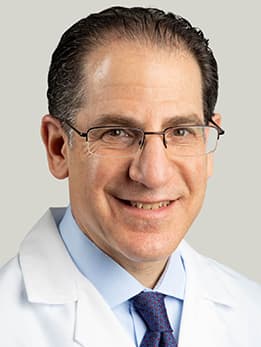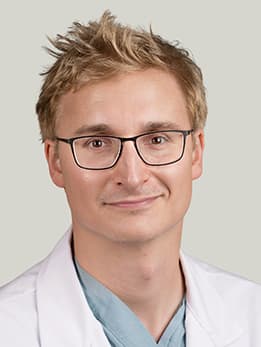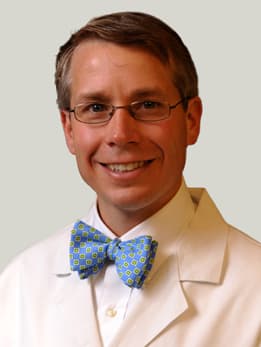Aortopathy
Patient-Centered, Multidisciplinary Approach to Aortopathy
The University of Chicago Medicine Aortopathy Program has a fully integrated team of adult and pediatric vascular surgeons, cardiac surgeons, cardiologists and nurses that collaborate to deliver comprehensive care to our patients from the initial meeting through long-term maintenance. At UChicago Medicine, we treat adults and children of all ages, including high-risk patients that have been turned away from other hospitals, and are committed to providing the best and safest solution(s) that are unique to our patients’ personalized healthcare and lifestyle goals.
Because we meet regularly to discuss new and current patients, our multidisciplinary team works together to create a plan that is tailored to each patient’s individual diagnosis, symptoms, risk factors and existing cardiovascular conditions. By maximizing the combined expertise, experiences and strengths of each team member, we offer a truly innovative, patient-centric approach to care that puts our patients at the forefront of aortopathy treatment.
What is aortopathy?
Aortopathy is a type of heart disease that affects the aorta, which carries oxygen-rich blood to critical organs and the rest of the body. With aortopathy, proper blood flow becomes limited or decreased in the body due to a weakened aortic wall and/or tear or rupture of the aorta. If this remains untreated, aortopathy can ultimately result in serious, and even life-threatening, conditions.
Types of Aortopathy
Aortopathy is characterized by a group of aortic conditions, so they are several types of aortopathy you could experience, with the most common types including:
- Adnominal aortic aneurysm: An abdominal aortic aneurysm (AAA) is a condition that occurs when the lower part of the aorta becomes enlarged and could rupture.
- Iliac aortic aneurysm: With an iliac aneurysm (IAA), the wall of the iliac artery that directs blood flow to the legs can expand and weaken, which puts the artery at risk for bursting.
- Thoracic aortic aneurysm: A thoracic aortic aneurysm (TAA) is a widening or ballooning of the ascending aorta, aortic arch and/or descending aorta located in the chest.
- Aortic root aneurysm: Aortic root aneurysms are aneurysms that occur in the aorta closest to the heart and can cause aortic valve insufficiency (“leaky valve”) and other problems.
- Aortic dissection: An aortic dissection is a tear or rip in the aortic wall, allowing blood to escape from the artery and deprive organs from oxygen-rich blood.
- Residual arch dissection: Patients who have undergone type A aortic dissection repair are often left with a difficult problem of residual aortic arch dissection and aneurysmal degeneration of the thoracic aorta, which can lead to stroke or rupture.
- Bicuspid aortic valve disease: Normally, the aortic valve has three leaflets, but there are cases in which the aortic valve is congenitally two leaflets, which is called a bicuspid aortic valve. It may cause abnormalities of the aortic valve (leak or narrowing) or enlargement of the ascending aorta over time.
- Connective tissue disorders: The body needs tissues to connect all the structures and muscles in the body, including the heart. With connective tissue disorders, the proteins needed for connective tissues are inflamed or damaged, which can weaken the aorta overtime.
Causes and Risk Factors for Aortopathy
The causes of aortopathy can include everything from congenital conditions, genetic/familiar predisposition or structural abnormalities to existing heart disease, lifestyle, age-related changes and more. Knowing what could increase your risk of aortopathy is the first step in diagnosing and preventing aortic disease early or slowing the progression of an existing condition sooner.
If you have a congenital heart condition – a heart abnormality you were born with – your condition may make you more likely to experience aortic disease because of your underlying heart defect. Common congenital disorders that can lead to aorta disease include:
- Bicuspid aortic valve
- Ventricular septal defect (VSD)
- Coarctation of the aorta
Inherited Conditions
There are specific inherited connective tissue conditions that can increase your risk of have aortic disease because of decreased structure, elasticity or muscle strength of the aorta, leading to an aneurysm, dissection or other aortic complications. These connective tissue disorders can include:
- Marfan Syndrome
- Ehlers-Danlos Syndrome
- Loeys-Dietz Syndrome
Genetic Mutations
In addition to inherited conditions, some patients might be at a higher risk of aortopathy due to gene mutations that are most associated with thoracic aortic aneurysms. If your family has a history of thoracic aortic aneurysm, it is important to know if you have a greater chance of aortic disease. Our Cardiovascular Genetics Clinic offers genetic testing for you and your family to identify those more likely to have an aortic aneurysm so that we can take a proactive, preventive approach as early as possible.
Your lifestyle and existing comorbities can lead to atherosclerosis, a condition defined by a buildup of fat and cholesterol (plaque) that has hardened in the walls of your arteries. The plaque narrows or blocks arteries, reduces blood flow and oxygen to the organs and tissues, and causes aortic disease. Risk factors that can contribute to atherosclerosis include:
- Smoking
- High cholesterol
- High blood pressure (hypertension)
- Diabetes
Aortic disease can be caused by a variety of factors, such as lifestyle or genetics, but you can also develop aortopathy based on factors beyond your control, such as:
- Age: Depending on your aortopathy, your risks can increase after the age of 65
- Gender: Aortic disease impacts men more than women
- Family history of aortic disease: It has been shown that there are higher incidences of aortic disease if one or more family members have been previously diagnosed
Diagnosing Aortopathy
To ensure we have an accurate diagnosis and treatment plan, we use imaging, specifically CTs and MRIs, and advanced computer tools that show the exact anatomy of a patient’s aorta to collect highly personalized anatomic details unique to every patient. Additionally, our team is focused on National Institutes of Health (NIH)-funded research that allows us to develop algorithms to help doctors select the treatment option (open surgery, total endovascular or hybrid aortic procedures) best suited to each individual patient. Our goal is to optimize the initial surgical success as well as provide long-term aortic stability and freedom from reintervention.
Prevention for Aortopathy
Once you know that you are at risk of aortopathy, prevention is one of the most important and effective ways to lower your chances of having severe aortic disease. Depending on your specific risk factors, prevention could include:
Lifestyle Management
Taking steps early to improve your healthy lifestyle can significantly reduce your risk of aortopathy. Maintaining a normal weight and scheduling regular appointments to monitoring your cholesterol, blood pressure and glucose can help you avoid long-term aortic issues.
Additionally, because smoking damages the aorta, making a dedicated effort to stop smoking can prevent aneurysm, dissections and other aortic issues in the long run. For additional support, consider joining our smoking cessation group designed to help at-risk patients who are struggling with quitting.
Genetic Testing
If you have an inherited cardiovascular disease that can increase your chances of aortic disease, our Cardiovascular Genetics Clinic has an expert team of counselors who perform genetic testing to identify if you or your family are at risk for Marfan syndrome, Ehlers-Danlos syndrome, Loeys-Dietz syndrome and more. We can help you navigate any genetic-related risks in order to prevent or minimize the impact the inherited condition can have on your aorta.
Routine Imaging/Scans
Because not all diagnosed aneurysms require immediate surgical intervention, we can use painless, noninvasive testing to monitor the shape and size of your aneurysm regularly. This allows us to hold off on surgery while preventing any additional aortic complications.
Treatment Options
UChicago Medicine offers a full range of medical and surgical therapies to treat aortopathy using customized treatment plans that address each patient’s symptoms, risk factors, comorbidities to deliver the best, most effective solutions for long-term success and quality of life. Personalized treatments may include one or more of the following:
- Controlling or modifying risk factors: Quit smoking, control blood pressure and/or cholesterol, manage blood sugar to prevent/control diabetes can all prevent or slow aortic disease
- Observation: For diagnosed aneurysms, having routine scans can monitor the size and rate of growth of an aneurysm and recommend additional treatments if/when necessary
- Medication: Decrease factors such as hyperlipidemia (elevated levels of fats in the blood) and/or high blood pressure
- Open Aneurysm Repair: Replacement of the diseased area of the aorta with a fabric graft
- Endovascular Aneurysm Repair: A minimally invasive alternative to the open repair
- Hybrid Aneurysm Repair: Combination of open surgery and endovascular to repair the aorta
- Access to Clinical Trials and Novel Devices: New therapies and innovative devices allow us to revolutionize treatment for aortopathy patients before the solutions become widely available.
Aortopathy Services and Resources
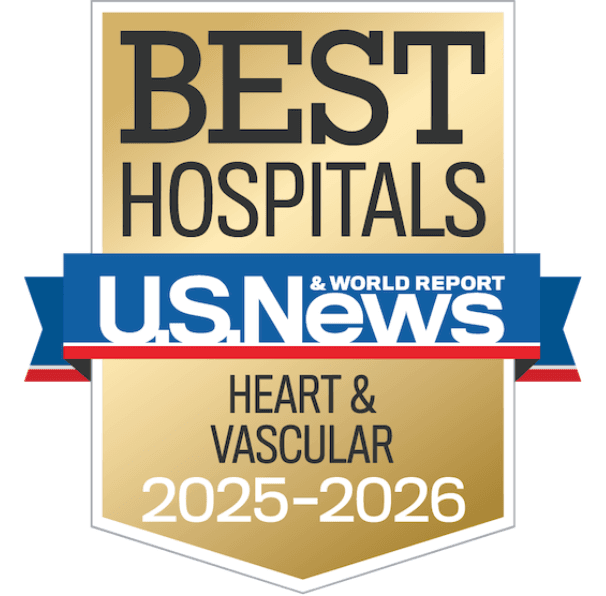
Nationally Ranked in Cardiology, Heart Surgery and Vascular Surgery
According to U.S. News & World Report's 2025-26 Rankings

High Performing in Aortic Valve Surgery
According to U.S. News & World Report's 2025-26 Rankings
Nationally Ranked in Cardiology, Heart Surgery and Vascular Surgery
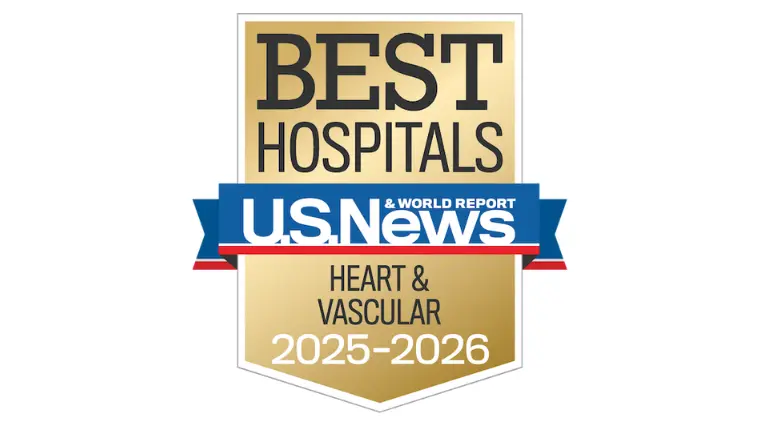
Meet Our Aortopathy Team
Find an Aortic Disease Specialist Near You
Request an Appointment
We are currently experiencing a high volume of inquiries, leading to delayed response times. For faster assistance, please call 1-773-702-6128 to schedule your appointment.
If you have symptoms of an urgent nature, please call your doctor or go to the emergency room immediately.
* Indicates required field

